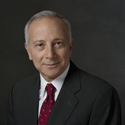 |
| Novartis' Mark Fishman |
Mark Fishman, head of Novartis' ($NVS) $10 billion research operation, is retiring next year after 13 years at the helm, making way for an award-winning Harvard oncologist.
Fishman will reach his contractual retirement age come March, the company said, at which point he will cede the reins of the Novartis Institutes for BioMedical Research (NIBR) to Jay Bradner, a physician-scientist now at the Dana-Farber Cancer Institute and Harvard Medical School. Bradner will come aboard NIBR in January, working with Fishman to smooth his transition to president, Novartis said.
Fishman's retirement caps a tenure that saw Novartis rise to become the world's largest drugmaker by revenue, successfully developing innovative medicines for cancer, heart disease, multiple sclerosis and ophthalmics. Over the past few years, under Fishman's leadership, NIBR has played a leading role in the high-profile development of treatments that use the body's natural defenses to fight cancer, carrying out cutting-edge work in CAR-T therapies alongside the University of Pennsylvania.
"Mark has done an outstanding job leading NIBR, and he will be missed," Novartis CEO Joseph Jimenez said in a statement. "He redefined research at Novartis--recruiting top scientists and clinicians from around the world, putting patient need and disciplined science at the center of our strategy, which has filled our pipeline with new medicines."
 |
| Jay Bradner |
In Bradner, Novartis has found a decorated replacement with a well-regarded track record in oncology. Since joining Dana-Farber in 2005, Bradner has co-authored more than 130 scientific articles delving into cancer gene expression, protein degradation and the role of bromodomains in tumor creation. He has also been active in the startup scene, lending his expertise to Agios Pharmaceuticals ($AGIO), Syros Pharmaceuticals and Acetylon Pharmaceuticals, among others.
Bradner has long been a proponent of open-source drug discovery, famously sharing his lead bromodomain inhibitor with hundreds of scientists for free instead of keeping the intellectual property locked away in his lab. That approach is unlikely to fly at Novartis, but Bradner has in the past outlined how academics and Big Pharma can work in tandem to advance therapies while satisfying their respective needs.
"Drug development is a team sport," he told the Broad Institute's website in a May interview. "About once a year, our work reaches a point where we become impatient to bring an idea to patients, convinced the molecule or approach could alleviate the burden of cancer. When this happens we need to become ideal collaborators for industry. … Working together with the local biopharmaceutical community has, for me, been a very positive and respectful experience."
And now he'll get to observe those interactions from the other side of the table, moving across the river from his Boston lab to NIBR's global headquarters in Cambridge, MA, and taking charge of the company's more than 6,000 scientists and nearly $10 billion annual research budget.
- read the statement